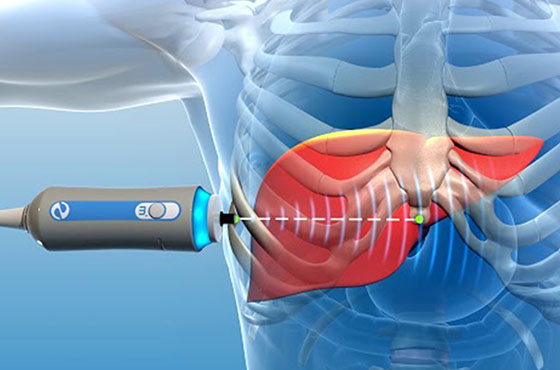
Fibroscan is a special form of scan for the liver
Fibroscan is a special form of scan for the liver. About 10 years ago, patients who were suspected to have liver disease, needed a liver biopsy to determine the severity of liver disease. Liver biopsy is an invasive procedure, and there is a small risk of bleeding related to the procedure. Now with the availability of Fibroscan, a lot of patients can have assessment of the severity of their liver disease without undergoing a liver biopsy.
Fibroscan is a quick office-based procedure, similar to an ultrasound scan. It is painless and non-invasive and takes only few minutes. What Fibroscan essentially tells is how stiff is the liver. A healthy liver is quite soft but as the liver gets diseased, it starts gets firm. Therefore, Fibroscan can be used to determine whether the liver is healthy or diseased. Similarly, Fibroscan can be repeated to assess the response to treatment.
The most important role of Fibroscan is in the assessment of patients with fatty liver. Fatty liver is a common problem now a days. Most people are detected to have fatty liver on ultrasound scans done on the abdomen for other reasons. Patients may also have mild abnormalities of their liver function tests. But without a liver biopsy, there is no way to tell whether the liver is damaged or not. In this situation, if a patient with fatty liver undergoes Fibroscan, we can determine whether the liver is damaged or not.
If there is only fatty liver but no liver damage, then this condition is called simple fatty liver. Simple fatty liver is not of much concern. On the other hand, if a patient has fatty liver with liver damage as assessed on Fibroscan, then it essential that patient is given specific treatment for fatty liver disease. In the absence of treatment, these patients may continue to have progressive liver damage and may develop advanced liver fibrosis and cirrhosis.
Most patients with fatty liver do not have any symptoms. But mere absence of symptoms should not lead patients to ignore this disease, since about 20-30% of patients with fatty liver may have evidence of liver damage that can progress to a more serious disease with time.
